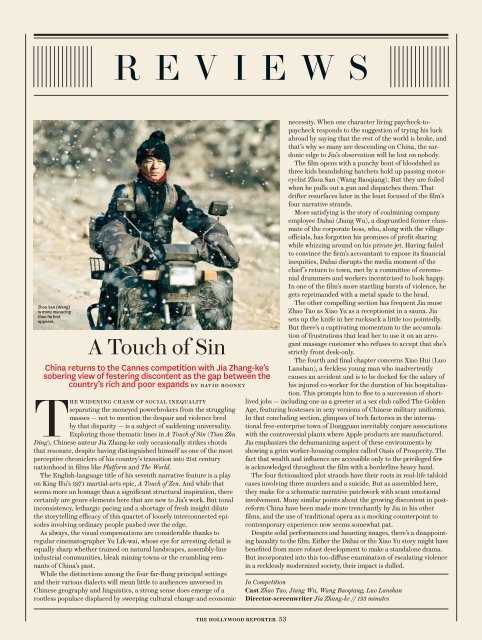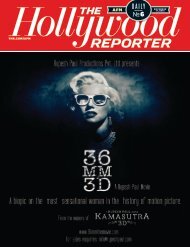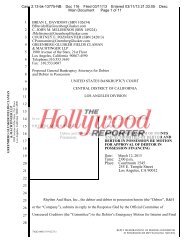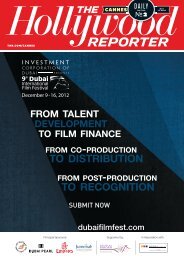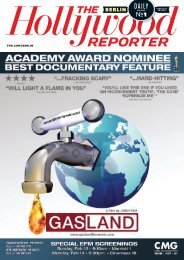You also want an ePaper? Increase the reach of your titles
YUMPU automatically turns print PDFs into web optimized ePapers that Google loves.
REVIEWS<br />
Zhou San (Wang)<br />
is more menacing<br />
than he first<br />
appears.<br />
A Touch of Sin<br />
China returns to the Cannes competition with Jia Zhang-ke’s<br />
sobering view of festering discontent as the gap between the<br />
country’s rich and poor expands BY DAVID ROONEY<br />
THE WIDENING CHASM OF SOCIAL INEQUALITY<br />
separating the moneyed powerbrokers from the struggling<br />
masses — not to mention the despair and violence bred<br />
by that disparity — is a subject of saddening universality.<br />
Exploring those thematic lines in A Touch of Sin (Tian Zhu<br />
Ding), Chinese auteur Jia Zhang-ke only occasionally strikes chords<br />
that resonate, despite having distinguished himself as one of the most<br />
perceptive chroniclers of his country’s transition into 21st century<br />
nationhood in films like Platform and <strong>The</strong> World.<br />
<strong>The</strong> English-language title of his seventh narrative feature is a play<br />
on King Hu’s 1971 martial-arts epic, A Touch of Zen. And while that<br />
seems more an homage than a significant structural inspiration, there<br />
certainly are genre elements here that are new to Jia’s work. But tonal<br />
inconsistency, lethargic pacing and a shortage of fresh insight dilute<br />
the storytelling efficacy of this quartet of loosely interconnected episodes<br />
involving ordinary people pushed over the edge.<br />
As always, the visual compensations are considerable thanks to<br />
regular cinematographer Yu Lik-wai, whose eye for arresting detail is<br />
equally sharp whether trained on natural landscapes, assembly-line<br />
industrial communities, bleak mining towns or the crumbling remnants<br />
of China’s past.<br />
While the distinctions among the four far-flung principal settings<br />
and their various dialects will mean little to audiences unversed in<br />
Chinese geography and linguistics, a strong sense does emerge of a<br />
rootless populace displaced by sweeping cultural change and economic<br />
necessity. When one character living paycheck-topaycheck<br />
responds to the suggestion of trying his luck<br />
abroad by saying that the rest of the world is broke, and<br />
that’s why so many are descending on China, the sardonic<br />
edge to Jia’s observation will be lost on nobody.<br />
<strong>The</strong> film opens with a punchy bout of bloodshed as<br />
three kids brandishing hatchets hold up passing motorcyclist<br />
Zhou San (Wang Baoqiang). But they are foiled<br />
when he pulls out a gun and dispatches them. That<br />
drifter resurfaces later in the least focused of the film’s<br />
four narrative strands.<br />
More satisfying is the story of coalmining company<br />
employee Dahai (Jiang Wu), a disgruntled former classmate<br />
of the corporate boss, who, along with the village<br />
officials, has forgotten his promises of profit sharing<br />
while whizzing around on his private jet. Having failed<br />
to convince the firm’s accountant to expose its financial<br />
inequities, Dahai disrupts the media moment of the<br />
chief’s return to town, met by a committee of ceremonial<br />
drummers and workers incentivized to look happy.<br />
In one of the film’s more startling bursts of violence, he<br />
gets reprimanded with a metal spade to the head.<br />
<strong>The</strong> other compelling section has frequent Jia muse<br />
Zhao Tao as Xiao Yu as a receptionist in a sauna. Jia<br />
sets up the knife in her rucksack a little too pointedly.<br />
But there’s a captivating momentum to the accumulation<br />
of frustrations that lead her to use it on an arrogant<br />
massage customer who refuses to accept that she’s<br />
strictly front desk-only.<br />
<strong>The</strong> fourth and final chapter concerns Xiao Hui (Luo<br />
Lanshan), a feckless young man who inadvertently<br />
causes an accident and is to be docked for the salary of<br />
his injured co-worker for the duration of his hospitalization.<br />
This prompts him to flee to a succession of shortlived<br />
jobs — including one as a greeter at a sex club called <strong>The</strong> Golden<br />
Age, featuring hostesses in sexy versions of Chinese military uniforms.<br />
In that concluding section, glimpses of tech factories in the international<br />
free-enterprise town of Dongguan inevitably conjure associations<br />
with the controversial plants where Apple products are manufactured.<br />
Jia emphasizes the dehumanizing aspect of these environments by<br />
showing a grim worker-housing complex called Oasis of Prosperity. <strong>The</strong><br />
fact that wealth and influence are accessible only to the privileged few<br />
is acknowledged throughout the film with a borderline heavy hand.<br />
<strong>The</strong> four fictionalized plot strands have their roots in real-life tabloid<br />
cases involving three murders and a suicide. But as assembled here,<br />
they make for a schematic narrative patchwork with scant emotional<br />
involvement. Many similar points about the growing discontent in postreform<br />
China have been made more trenchantly by Jia in his other<br />
films, and the use of traditional opera as a mocking counterpoint to<br />
contemporary experience now seems somewhat pat.<br />
Despite solid performances and haunting images, there’s a disappointing<br />
banality to the film. Either the Dahai or the Xiao Yu story might have<br />
benefited from more robust development to make a standalone drama.<br />
But incorporated into this too-diffuse examination of escalating violence<br />
in a recklessly modernized society, their impact is dulled.<br />
In Competition<br />
Cast Zhao Tao, Jiang Wu, Wang Baoqiang, Luo Lanshan<br />
Director-screenwriter Jia Zhang-ke // 133 minutes<br />
THE HOLLYWOOD REPORTER 53


